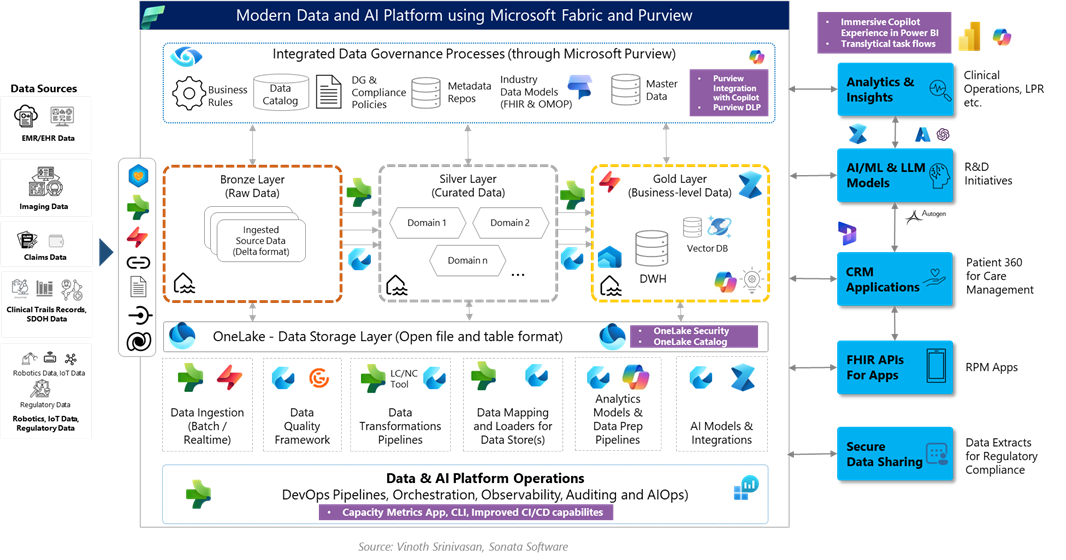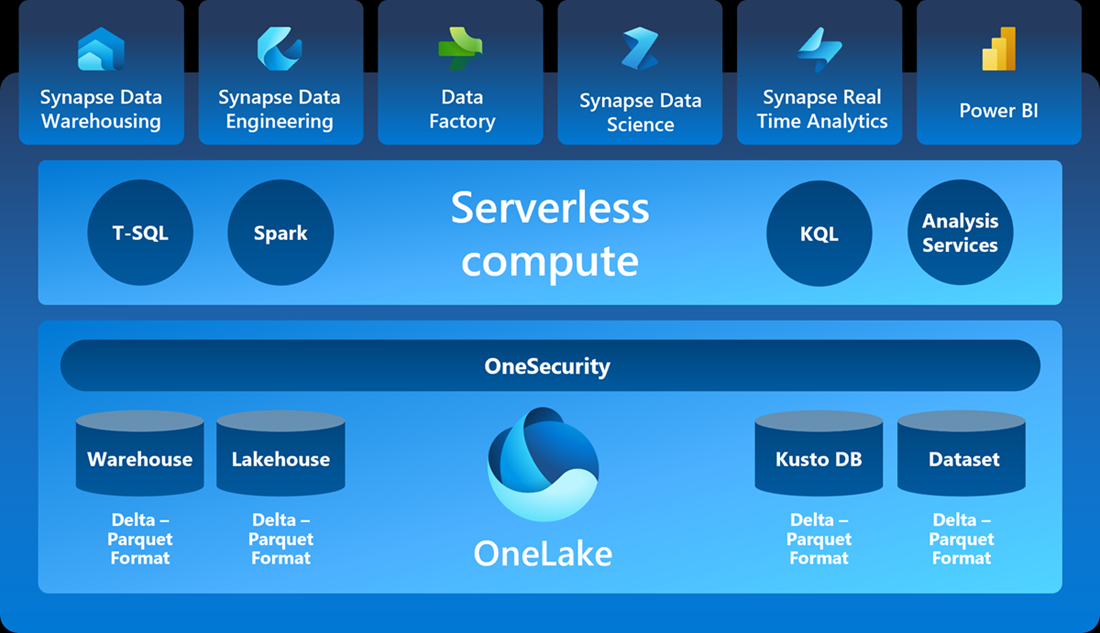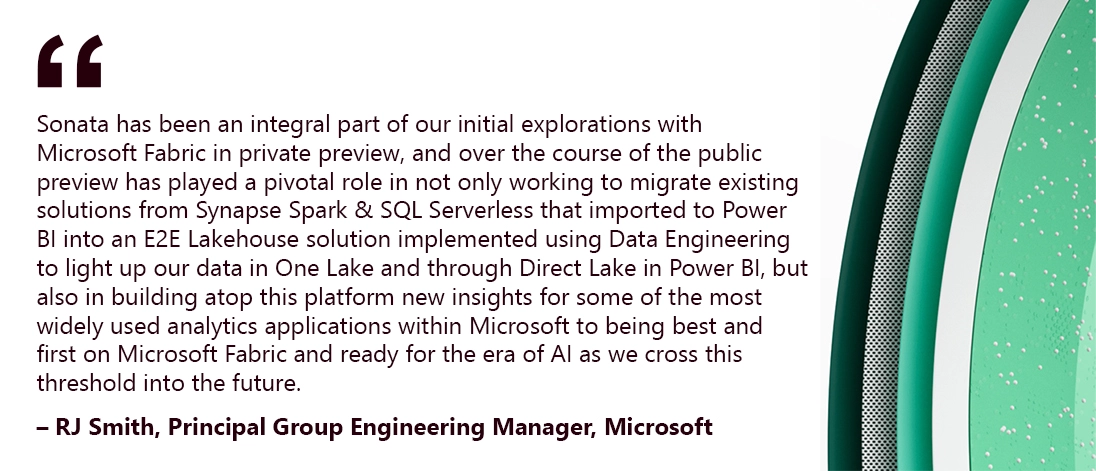In recent years, the Healthcare and Life Sciences (HLS) industry have experienced significant transformations, driven by the convergence of Data and Artificial Intelligence (AI). This convergence has reshaped various aspects of the industry, including patient care management, clinical decision-making processes, research endeavors, and operational efficiency.
The adoption of AI in healthcare is anticipated to accelerate, with projections indicating that the market will reach $164.16 billion by 2030, growing at a CAGR of 49.1% during the forecast period (1). This growth underscores the transformative potential of AI technologies in revolutionizing healthcare systems worldwide.
Intelligent Data and AI platforms, particularly Microsoft Fabric, are at the forefront, enabling breakthroughs and transforming healthcare delivery and accelerating innovations.
Healthcare's Key Data Challenges
The healthcare industry operates in a highly complex and regulated environment where data sensitivity and compliance requirements create significant challenges. While Intelligent Data and AI platforms offer transformative potential, healthcare organizations must overcome numerous obstacles to fully harness their benefits. Here are some key challenges that the healthcare industry faces:
Data Silos
Fragmented data across disparate systems hinder seamless access and integration, making it difficult to extract valuable insights.
Data Quality
Ensuring data quality and safeguarding sensitive patient information against cyberattacks remain as ongoing struggles.
Regulatory Compliance
Compliance with various regulations, such as HIPAA and GDPR, adds another layer of complexity, necessitating robust governance frameworks.
Interoperability
The lack of standardization complicates the interoperability of data exchange among different healthcare systems and devices.
Actionable Insights & Scalability
Extracting actionable insights from vast amounts of data requires advanced analytics capabilities. Scalability challenges arise with the exponential growth of data, especially with the adoption of digital health technologies.
Balancing Innovation & Responsibility
Navigating the intersection of data-driven innovation, ethical considerations, and regulatory compliance requires careful planning, collaboration, and responsible AI adoption.
Although over 80% of healthcare executives prioritize AI adoption, a lack of data readiness continues to hinder lasting progress. To fully leverage AI’s potential, healthcare organizations need robust AI-driven technology capabilities, strong governance frameworks, and a resilient infrastructure that ensures seamless data management, regulatory compliance, and scalable innovation.
Healthcare Solutions by Microsoft Fabric
Microsoft Fabric – an end-to-end, a comprehensive Unified Data and AI platform that seamlessly integrates all essential data and analytics tools into a single ecosystem. Fabric goes beyond generic solutions by offering industry-specific capabilities designed to address the unique challenges faced by HLS industry. By tailoring data solutions to the specific needs of the healthcare industry, Microsoft Fabric empowers organizations to unlock the full potential of their data and achieve optimal results.
When combined with Healthcare industry solutions, Microsoft Fabric offers a comprehensive suite of capabilities to build a robust Data and AI platform tailored to address the challenges mentioned above. Healthcare data solutions within Microsoft Fabric provide an holistic, analytics SaaS platform that enables organizations to ingest, store, and analyze healthcare data from various sources, including electronic health records, picture archiving, communication systems, and more.
Enterprises can expedite their time-to-value by leveraging Microsoft Fabric's healthcare industry solutions. The platform allows organizations to efficiently manage the complexities of healthcare data and harness the transformative potential of Data and AI-driven insights. Below is a reference architecture how these components come together to form a cohesive solution.

Data Ingestion
With native connectors like Fabric Data Factory and Azure Health Data Services (FHIR Datasets), organizations can easily ingest a wide array of data from disparate sources (EMR/EHR, Clinical Records, Imaging Data- FHIR, Claims Data, SDOH Data, Regulatory Data) into OneLake storage within Microsoft Fabric. Real Time Intelligence can be leveraged for processing streaming Healthcare data. OneLake serves as a unified data management solution, efficiently storing large volumes of data, breaking down silos, and offering cost-effective storage. It is seamlessly integrated into every Microsoft Fabric tenant, eliminating the need for additional infrastructure management
Data Management
Implement the medallion architecture pattern using Microsoft OneLake and Lakehouse capabilities. This architecture pattern involves organizing data across three layers: Bronze (Raw), Silver (Curated and Augmented), and Gold (Business-level Aggregated) layers (Lakehouse) to facilitate seamless data processing and analytics. This multi-layered approach establishes a single source of truth for enterprise data products. The lakehouse architecture in Microsoft Fabric combines both Data Lakes and Data Warehouses, storing data in open file format (delta-parquet) and this enables to run large-scale analytics workloads in a cost-effective manner.
Data Engineering
Leverage Microsoft Fabric's Synapse Data Engineering Notebooks, Fabric Data Factory (LCNC), Real-Time Intelligence capabilities to develop scalable data pipelines. These pipelines consolidate and transform data according to target data domains and analytics data stores, aligning with industry-standard data models (e.g. FHIR). This ensures interoperability and adherence to industry standards.
We can also leverage Microsoft fabric’s User Data Functions to implement and re-use custom, specialized business logic in Fabric data engineering and data science notebooks, enabling developers to more easily build custom experiences and improve efficiency for healthcare data initiatives
Analytics and Insights
To access and derive actionable insights from healthcare data within Microsoft Fabric, organizations can utilize familiar tools such as Microsoft Fabric Lakehouse SQL-endpoint, Synapse Data Science Notebooks, Power BI (with copilot), Custom Copilot, RAG, Agentic AI solutions leveraging Azure OpenAI Services and Cosmos DB (Vector DB). Examples include patient cohort analysis, risk stratification models, and longitudinal patient view, patient insights through custom copilot and RAG applications etc.
Platform Operationalization
Integrate Azure DevOps capabilities seamlessly with Microsoft Fabric to automate and streamline the operationalization of data platforms. This integration enables faster delivery of changes, improved reliability, and enhanced collaboration among development, operations, and data teams, ensuring efficient data platform management and evolution. Healthcare IT administrators can now utilize enhanced Capacity Metrics Apps within Fabric to meticulously monitor data usage and optimize resource allocation across critical healthcare systems. These updates provide detailed chargeback reports for departmental usage (e.g., radiology, pathology), multi-capacity insights for diverse data workloads (like genomic sequencing and clinical trial analysis), and historical performance lineage for compliance audits.
The new Fabric CLI terminal will allow you to execute commands across Fabric using interactive command-line prompts or a script. It provides a code-first, no clicks experience for users and admins who want to explore and use Fabric via code. There are additional CI/CD enhancements that will enable end-to-end CI/CD support across the Fabric platform with the introduction of variable libraries for workspaces, Service principal support for GitHub, deployment pipelines Fabric APIs phase II.
Comprehensive Data Governance
Azure Purview and Microsoft Fabric together provide a holistic data governance solution tailored for the healthcare and life sciences industry. This solution enables organizations to establish and enforce robust data governance standards and processes, ensuring data privacy, regulatory compliance, data quality & data security.
Purview, integrated with Copilot in Fabric for Power BI, now strengthens healthcare data governance and compliance. It automatically detects sensitive Protected Health Information (PHI) in Copilot interactions, provides tailored security recommendations for HIPAA compliance, and allows for thorough audits of AI-driven data analysis to mitigate risks associated with unauthorized PHI access or usage. Healthcare security administrators can now leverage Purview Data Loss Prevention (DLP) within Fabric to automatically detect uploads of sensitive PHI data, such as patient medical records or insurance details, across diverse data sources including KQL databases and mirrored data lakes.
OneLake security takes the healthcare data protection to next level where you will have to define access once, and Fabric enforces it consistently across all engines. It enables robust security measures to protect data and control access at rows and column level. By leveraging these technologies, organizations can harness the full potential of their data, driving innovation, improving patient outcomes, and maintaining the highest standards of data governance and security.
Microsoft Fabric offers a powerful solution for the data challenges plaguing the healthcare industry. It enables seamless integration, efficient data management, and innovative patient engagement features. But implementing and harnessing its full potential requires expertise. Sonata played a pivotal role in the development of Microsoft Fabric and were honored to be its Featured and Launch Partner. Our team possesses deep industry knowledge and extensive experience in crafting customized solutions for the unique problems faced by healthcare organizations. Contact Sonata today to discuss how we can help you leverage this powerful platform to achieve your digital transformation goals.
Reference
















